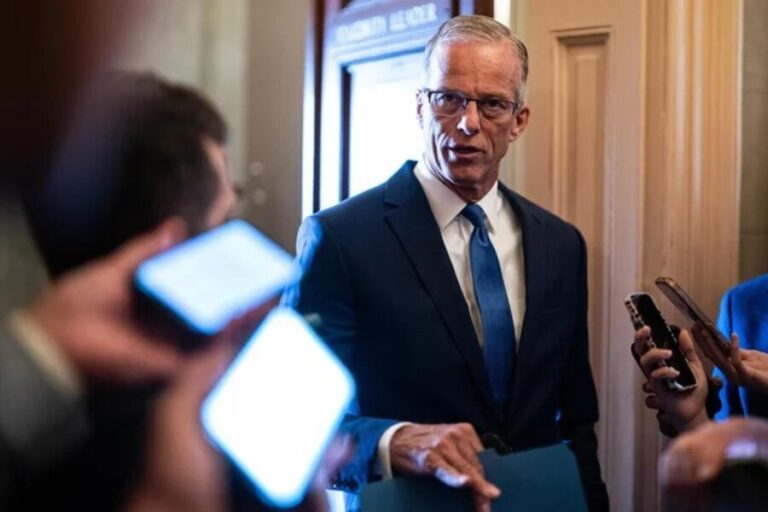The U.S. Senate is racing against the clock to advance President Trump’s ambitious “one big beautiful bill” — a comprehensive legislative package that includes tax reforms, defense funding, and energy measures — aiming to deliver it to the president’s desk by the Fourth of July. This push comes after a narrow House approval last month and amid lingering divisions within the Republican ranks over key provisions.
“We have a lot to get done this month,” Senate Majority Leader John Thune (R-S.D.) told reporters on Monday. “The biggest focus in the Senate is on getting the president’s agenda passed,” Thune emphasized that while the Senate is working off the House-passed bill, changes will be necessary to secure the narrow Republican majority needed for final passage.
The House narrowly approved the legislation last month after weeks of internal debate, particularly over proposed Medicaid restrictions. The bill advanced despite fierce opposition from Democrats and hesitation from some Republicans. The measure now moves to the Senate, where those same disagreements, plus new concerns about spending and procedural challenges, threaten to derail the GOP’s momentum.
Thune acknowledged the delicate balancing act ahead, noting that the House bill “struck a very delicate balance in getting it passed in the first place.” However, he cautioned that some senators have specific requests for changes, including potential tweaks to Medicaid provisions and the overall spending structure. “We’ll have to track the Senate version fairly closely with the House bill,” Thune said, alluding to the fragile majority.
With a slim majority, Republicans can afford to lose only three votes if they hope to pass the bill without Democratic support. Already, several GOP senators have voiced reservations, signaling potential hurdles in the days ahead.
Sen. Ron Johnson (R-Wis.) has been vocal about the need for deeper spending cuts beyond the $1.5 trillion currently outlined in the bill. He also advocates for decoupling the debt ceiling increase from the broader package. After meeting with President Trump on Monday, Johnson described their conversation as “very respectful,” noting that while they share the same ultimate goal, they differ on the strategy to achieve it.
Sen. Rand Paul (R-Ky..) has pledged to oppose the bill due to the inclusion of a debt ceiling increase. On Tuesday, Trump took to Truth Social to criticize Paul, accusing him of voting “NO on everything” without offering “practical or constructive ideas.”
Another Republican holdout, Sen. Josh Hawley (R-Mo…), has raised concerns about potential Medicaid cuts. Hawley told reporters that Trump personally assured him there would be “no Medicaid benefit cuts,” but the senator remains wary of changes to provider taxes and copay requirements that could impact constituents.
President Trump has taken an active role in pressing senators to act swiftly. “With the Senate coming back to Washington today, I call on all of my Republican friends in the Senate and House to work as fast as they can to get this Bill to MY DESK before the Fourth of JULY,” he wrote on Truth Social.
Further complicating the Senate’s efforts are the strict limits imposed by the reconciliation process, which allows the bill to bypass the 60-vote threshold but requires all provisions to have direct budgetary impacts. Under the Senate’s Byrd Rule, any provision deemed unrelated to the budget could be challenged and potentially stripped from the bill.
Thune acknowledged these hurdles, noting that “Byrd conversations” have already started and would continue over the coming weeks. When pressed on whether Republicans would consider overruling the parliamentarian if a key provision were struck, Thune was non-committal: “We’re not going there,” he said.
With just weeks remaining until the July 4 target date, Senate Republicans are navigating a minefield of fiscal, procedural, and political obstacles. Thune remains optimistic that a consensus can be reached, but the fragile GOP majority and competing demands from individual senators may complicate the effort.
If the Senate passes a revised version of the bill, it would return to the House for final approval before heading to President Trump’s desk. Whether lawmakers can meet the ambitious deadline remains uncertain, but one thing is clear: the stakes are high, and the clock is ticking.
